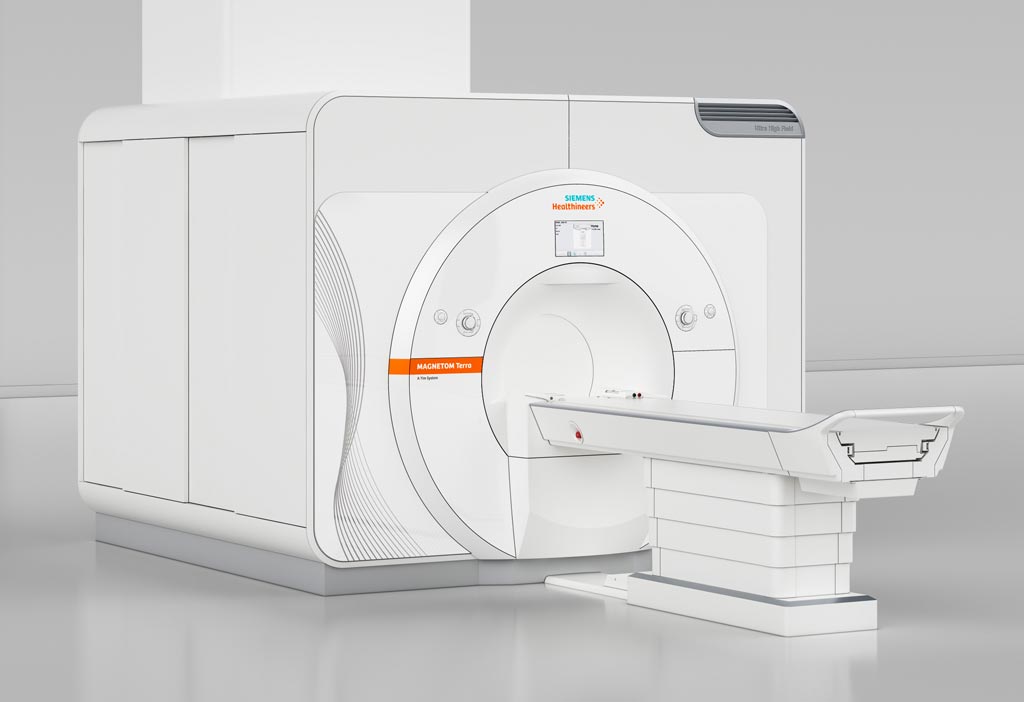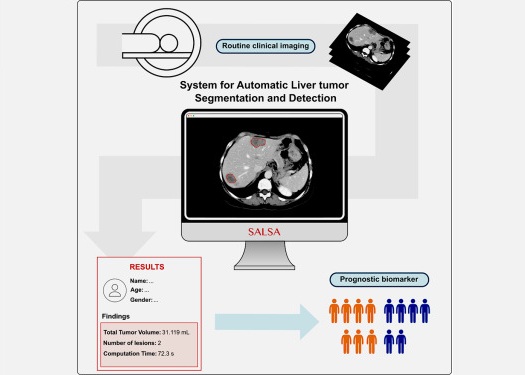CE Approval Announced for First 7T MRI Scanner
|
By MedImaging International staff writers Posted on 05 Sep 2017 |

Image: The new 7T Magnetom Terra MRI scanner is the first ultra-high-field MR scanner that has been approved for clinical use (Photo courtesy of Siemens Healthineers).
A major medical imaging equipment provider has announced CE Mark (Conformité Européenne) approval of a new Ultra-High-Field (UHF) 7-T MRI scanner.
The new Magnetic Resonance Imaging (MRI) scanner provides more detail for neurological, and Musculoskeletal (MSK) precision medicine applications in the clinical environment.
The Dual-Mode Magnetom Terra scanner was developed by Siemens Healthineers (Erlangen, Germany), and is intended both for clinical and research applications. According to Siemens, the scanner could potentially become a significant platform for translational research.
The scanner has a high spatial and spectral resolution, and can provide detailed insights into the human MSK system, metabolic processes in the brains, and help visualize epilepsy, Alzheimer's, Multiple Sclerosis (MS), and other neurological diseases. According to Siemens, brain lesions will be easier to identify using the higher resolution, and improved image contrast of the Magnetom Terra scanner. The Magnetom Terra scanner is currently pending US FDA 510(k) approval.
SVP and GM of the Magnetic Resonance Imaging group at Siemens Healthineers, Dr. Christoph Zindel, said, "Thanks to our long-standing commitment and experience with ultra-high-field MRI as well as our extensive innovation network of collaboration partners around the world, we are now establishing 7T imaging in the clinical routine with Magnetom Terra. Having now gained approval for clinical use, we are expanding the scope of diagnostic MRI – 15 years after 3T scanners first became established. With this new clinical field strength, we can achieve a new level of detail in anatomy and function, helping further pave the way for precision medicine. I am convinced that Magnetom Terra will help grow the footprint of 7 Tesla in research and clinical application, allowing us to further explore new territories in MRI."
The new Magnetic Resonance Imaging (MRI) scanner provides more detail for neurological, and Musculoskeletal (MSK) precision medicine applications in the clinical environment.
The Dual-Mode Magnetom Terra scanner was developed by Siemens Healthineers (Erlangen, Germany), and is intended both for clinical and research applications. According to Siemens, the scanner could potentially become a significant platform for translational research.
The scanner has a high spatial and spectral resolution, and can provide detailed insights into the human MSK system, metabolic processes in the brains, and help visualize epilepsy, Alzheimer's, Multiple Sclerosis (MS), and other neurological diseases. According to Siemens, brain lesions will be easier to identify using the higher resolution, and improved image contrast of the Magnetom Terra scanner. The Magnetom Terra scanner is currently pending US FDA 510(k) approval.
SVP and GM of the Magnetic Resonance Imaging group at Siemens Healthineers, Dr. Christoph Zindel, said, "Thanks to our long-standing commitment and experience with ultra-high-field MRI as well as our extensive innovation network of collaboration partners around the world, we are now establishing 7T imaging in the clinical routine with Magnetom Terra. Having now gained approval for clinical use, we are expanding the scope of diagnostic MRI – 15 years after 3T scanners first became established. With this new clinical field strength, we can achieve a new level of detail in anatomy and function, helping further pave the way for precision medicine. I am convinced that Magnetom Terra will help grow the footprint of 7 Tesla in research and clinical application, allowing us to further explore new territories in MRI."
Latest MRI News
- Cutting-Edge MRI Technology to Revolutionize Diagnosis of Common Heart Problem
- New MRI Technique Reveals True Heart Age to Prevent Attacks and Strokes
- AI Tool Predicts Relapse of Pediatric Brain Cancer from Brain MRI Scans
- AI Tool Tracks Effectiveness of Multiple Sclerosis Treatments Using Brain MRI Scans
- Ultra-Powerful MRI Scans Enable Life-Changing Surgery in Treatment-Resistant Epileptic Patients
- AI-Powered MRI Technology Improves Parkinson’s Diagnoses
- Biparametric MRI Combined with AI Enhances Detection of Clinically Significant Prostate Cancer
- First-Of-Its-Kind AI-Driven Brain Imaging Platform to Better Guide Stroke Treatment Options
- New Model Improves Comparison of MRIs Taken at Different Institutions
- Groundbreaking New Scanner Sees 'Previously Undetectable' Cancer Spread
- First-Of-Its-Kind Tool Analyzes MRI Scans to Measure Brain Aging
- AI-Enhanced MRI Images Make Cancerous Breast Tissue Glow
- AI Model Automatically Segments MRI Images
- New Research Supports Routine Brain MRI Screening in Asymptomatic Late-Stage Breast Cancer Patients
- Revolutionary Portable Device Performs Rapid MRI-Based Stroke Imaging at Patient's Bedside
- AI Predicts After-Effects of Brain Tumor Surgery from MRI Scans
Channels
Radiography
view channel
AI Improves Early Detection of Interval Breast Cancers
Interval breast cancers, which occur between routine screenings, are easier to treat when detected earlier. Early detection can reduce the need for aggressive treatments and improve the chances of better outcomes.... Read more
World's Largest Class Single Crystal Diamond Radiation Detector Opens New Possibilities for Diagnostic Imaging
Diamonds possess ideal physical properties for radiation detection, such as exceptional thermal and chemical stability along with a quick response time. Made of carbon with an atomic number of six, diamonds... Read moreUltrasound
view channel.jpeg)
AI-Powered Lung Ultrasound Outperforms Human Experts in Tuberculosis Diagnosis
Despite global declines in tuberculosis (TB) rates in previous years, the incidence of TB rose by 4.6% from 2020 to 2023. Early screening and rapid diagnosis are essential elements of the World Health... Read more
AI Identifies Heart Valve Disease from Common Imaging Test
Tricuspid regurgitation is a condition where the heart's tricuspid valve does not close completely during contraction, leading to backward blood flow, which can result in heart failure. A new artificial... Read moreNuclear Medicine
view channel
Novel Radiolabeled Antibody Improves Diagnosis and Treatment of Solid Tumors
Interleukin-13 receptor α-2 (IL13Rα2) is a cell surface receptor commonly found in solid tumors such as glioblastoma, melanoma, and breast cancer. It is minimally expressed in normal tissues, making it... Read more
Novel PET Imaging Approach Offers Never-Before-Seen View of Neuroinflammation
COX-2, an enzyme that plays a key role in brain inflammation, can be significantly upregulated by inflammatory stimuli and neuroexcitation. Researchers suggest that COX-2 density in the brain could serve... Read moreGeneral/Advanced Imaging
view channel
AI-Based CT Scan Analysis Predicts Early-Stage Kidney Damage Due to Cancer Treatments
Radioligand therapy, a form of targeted nuclear medicine, has recently gained attention for its potential in treating specific types of tumors. However, one of the potential side effects of this therapy... Read more
CT-Based Deep Learning-Driven Tool to Enhance Liver Cancer Diagnosis
Medical imaging, such as computed tomography (CT) scans, plays a crucial role in oncology, offering essential data for cancer detection, treatment planning, and monitoring of response to therapies.... Read moreImaging IT
view channel
New Google Cloud Medical Imaging Suite Makes Imaging Healthcare Data More Accessible
Medical imaging is a critical tool used to diagnose patients, and there are billions of medical images scanned globally each year. Imaging data accounts for about 90% of all healthcare data1 and, until... Read more
Global AI in Medical Diagnostics Market to Be Driven by Demand for Image Recognition in Radiology
The global artificial intelligence (AI) in medical diagnostics market is expanding with early disease detection being one of its key applications and image recognition becoming a compelling consumer proposition... Read moreIndustry News
view channel
GE HealthCare and NVIDIA Collaboration to Reimagine Diagnostic Imaging
GE HealthCare (Chicago, IL, USA) has entered into a collaboration with NVIDIA (Santa Clara, CA, USA), expanding the existing relationship between the two companies to focus on pioneering innovation in... Read more
Patient-Specific 3D-Printed Phantoms Transform CT Imaging
New research has highlighted how anatomically precise, patient-specific 3D-printed phantoms are proving to be scalable, cost-effective, and efficient tools in the development of new CT scan algorithms... Read more
Siemens and Sectra Collaborate on Enhancing Radiology Workflows
Siemens Healthineers (Forchheim, Germany) and Sectra (Linköping, Sweden) have entered into a collaboration aimed at enhancing radiologists' diagnostic capabilities and, in turn, improving patient care... Read more





















